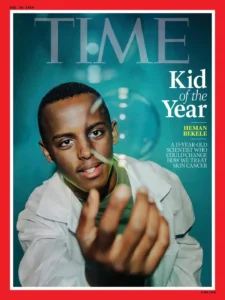Ethiopia: Heman Bekele, an Ethiopian student has been recognised by the renowned magazine TIME as Kid of the Year-2024. The 15-year-old kid is being praised for inventing a soap that would be beneficial in treating and preventing some skin cancers in the future.
The soap invented by Bekele, has nano-particles and ensures that the drug form a layer and stays on the skin even after washing.
Heman Bekele extracted the most dangerous out of his “potions” when he was just about 7 years old. He’d been conducting his own science experiments for about three years by that point, mixing up whatever he could get in his hands on at home and waiting to see if the resulting mixture would turn into anything.
Explaining about the ingredients, he said, “They were just dish soap, laundry detergent, and common household chemicals. I used to hide them under my bed and used wait and see what would happen if I left them overnight. There was a lot of mixing together completely at random.”
Bekele added further, “But soon, things got less random.” For Christmas before his 7th birthday, Heman was given a chemistry set that came with a sample of sodium hydroxide.

By then, he had been researching chemical reactions online and learned that aluminium and sodium hydroxide can together produce prodigious amounts of heat. This prompted him to consider that perhaps he could do the world some good.
“I thought that this could be a solution to energy, to making an unlimited supply, but I almost started a fire,” said Heman.
It was October 2023, that the 3M company and Discovery Education selected Heman, a rising 10th-grader at Woodson High School in Fairfax County, Virginia, as the winner of its Young Scientist Challenge. He won prize of amount $25,000, for inventing a soap that could one day treat and even prevent multiple forms of skin cancer.
This might to years before such a product comes to market, but this summer Heman is already spending part of every weekday working in a lab at the Johns Hopkins Bloomberg School of Public Health in Baltimore, hoping to bring his dream to fruition.
When school will be running their regular sessions, he’ll be there less often, but will continue to plug away. Bekele expressed, “I’m really passionate about skin-cancer research, whether it’s my own research or what’s happening in the field. It’s absolutely incredible to think that one day my bar of soap will be able to make a direct impact on somebody else’s life and will treat them. That’s the reason I started this all in the first place.”
It’s the ambition, which says nothing of that selflessness, that has earned Heman recognition as TIME’s Kid of the Year for 2024.
Born in Addis Ababa of Ethiopia, before emigrating to the U.S. with his family when he was just 4 years old. Heman recalls that some of his earliest memories involves watching laborers working in the blistering sun, usually with no protection for their skin.
His parents taught him and his sisters Hasset, aged 16 and Liya, aged 7, to cover up and explained the dangers of too much time outdoors without sunscreen or proper clothing.
Heman narrated, “When I was younger, I didn’t think much of it, but when I came to America, I realized what a big problem the sun and ultraviolet radiation is when you’re exposed to it for a long time.” It wasn’t hard for him to think about how he might help.
A few years ago, he read about ‘Imiquimod’, a drug that, along with other uses, is approved to fight one form of skin cancer and has shown promise against several more.
Especially Imiquimod, can help in destroying tumors and usually comes in the form of a cream. It is prescribed as a front-line drug as part of a broader cancer treatment plan, but Heman wondered if it could be made available more easily to people in the earliest stages of the disease.
A bar of soap might be just the delivery system for such a lifesaving drug, not just because it was simple, but because it would be a lot more affordable than the $40,000 it typically costs for skin-cancer treatment, he reckoned.
“What’s the one thing that is an internationally impactful idea, something that everyone can use, regardless of socio-economic class?” Heman reminds. “Almost everyone use soap and water for cleaning. So soap would probably be the best option,” he collected.
There was a long way to cover the journey between inspiration and application. However, executing on his idea was more complicated than simply mixing the drug into an ordinary bar of soap, since any therapeutic power the imiquimod might confer would just be washed down the drain with the suds.
The answer emerged and it was to combine the soap with a lipid-based nanoparticle that would linger on the skin when the soap was washed away much the way moisturizer or fragrance can stay behind after the suds are rinsed off.
See the complete video here, of his great journey of inventing the soap and becoming the Kid of the Year 2024.

